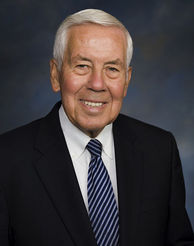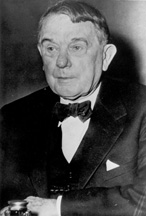Lugar Could Become Just 2nd 6-Term Senator to Lose Renomination Bid in 100 Years
Only one six-term U.S. Senator has lost his party’s nomination out of two-dozen who completed their sixth term in the direct election era

Six-term Indiana GOP Senator Dick Lugar is on the ropes in his renomination bid against primary challenger Richard Mourdock who serves as Treasurer of the Hoosier State.
Indiana’s primary will be held next Tuesday in a race where ads sponsored by a pro-Lugar PAC have recently been pulled – suggesting the intraparty coup many have suspected would befall the longtime member of the Senate will indeed come to fruition.
In the 2010 cycle, Republicans saw three-term Utah Senator Bob Bennett and two-term Alaska Senator Lisa Murkowski fall in the GOP convention/primary process, while five-term Pennsylvania Senator Arlen Specter switched parties knowing full well that he would lose his primary to eventual general election winner, Pat Toomey. (Murkowski ultimately retained her seat through a write-in campaign).
But if Senator Lugar loses next Tuesday, he’ll join an exclusive club with a current membership of just one.
A Smart Politics review of U.S. Senate election data finds that if Dick Lugar loses the Indiana Republican primary election on May 8th, he will become just the second six-term U.S. Senator – and the first Republican – to fail in his renomination bid in the direct election era of the past 100 years.
A total of 34 popularly-elected U.S. Senators have served into their sixth term since the introduction of direct elections of senators in the early 1910s.

McKellar was the Volunteer State’s first popularly elected senator to its Class I seat in 1916, winning with 54.4 percent of the vote.
He would go on to win with 68.0 percent of the vote in 1922, 59.3 percent in 1928, 63.4 percent in 1934, 70.8 percent in 1940, and 66.6 percent in 1946.
But in 1952, McKellar faced a primary challenge from seven-term U.S. Representative Al Gore, Sr.
Gore – who at age 44 was 39 years younger than the sitting Senator – defeated McKellar in that summer’s Democratic primary by a decisive 57.8 percent to 42.2 percent margin.
No other six-term incumbent seeking reelection has failed to win his party’s nomination ever since, and only one has lost in the general election: Washington Democrat Warren Magnuson to Republican Slade Gorton in 1980.
Here is the complete tally of the fate of 34 U.S. Senators serving in their sixth term in the direct election era…
4 died in office:
· Louisiana Democrat Allen Ellender in 1972
· Arkansas Democrat John McClellan in 1977
· Washington Democrat Scoop Jackson in 1983
· North Dakota Democrat Quentin Burdick in 1992
9 chose not to run for reelection:
· Georgia Democrat Walter George in 1956
· Alabama Democrat J. Lister Hill in 1968
· Vermont Republican George Aiken in 1974
· Alabama Democrat John Sparkman in 1978
· Mississippi Democrat James Eastland in 1978
· North Dakota Democrat Milton Young in 1980
· Wisconsin Democrat William Proxmire in 1988
· Rhode Island Democrat Claireborne Pell in 1996
· New Mexico Republican Pete Domenici in 2008
1 lost in the primary election:
· Tennessee Democrat Kenneth McKellar in 1952
1 lost in the general election:
· Washington Democrat Warren Magnuson in 1980
13 went on to win a seventh term:
· Arizona Democrat Carl Hayden in 1962
· Virginia Democrat Harry Byrd in 1964
· Georgia Democrat Richard Russell in 1966
· Louisiana Democrat Russell Long in 1980
· Mississippi Democrat John Stennis in 1982
· South Carolina Republican Strom Thurmond in 1990
· Massachusetts Democrat Ted Kennedy in 1994
· West Virginia Democrat Robert Byrd in 1994
· Hawaii Democrat Dan Inouye in 1998
· South Carolina Democrat Fritz Hollings in 1998
· Alaska Republican Ted Stevens in 2002
· Delaware Democrat Joe Biden in 2008
· Vermont Democrat Patrick Leahy in 2010
6 others are currently serving in their 6th term:
· Indiana Republican Dick Lugar (up for election in 2012)
· Utah Republican Orrin Hatch (2012)
· Michigan Democrat Carl Levin (2014)
· Montana Democrat Max Baucus (2014)
· Mississippi Republican Thad Cochran (2014)
· Iowa Republican Chuck Grassley (2016)
Prior to Lugar and Orrin Hatch, the average age of the 24 U.S. Senators who reached the end of their 6th term had been 75.6 years at the time of the general election.
At 80 years old, Lugar is now the fifth oldest of the 17 six-term U.S. Senators who opted to run for a seventh term, including Hatch who is 78.
Only Strom Thurmond of South Carolina at 88 years old, Carl Hayden of Arizona at 85, Kenneth McKellar of Tennessee at 83, and John Stennis of Mississippi at 81 were older than Lugar when running for their seventh term.
Sparse polling in Indiana has shown Democrats to have a much better chance of picking up the Senate seat if Mourdock defeats Lugar in the GOP primary, and history suggests this is the case.
Of the 10 instances in which six-term incumbents either chose not to seek reelection or were defeated in the primary, the opposing party picked up the seat three times:
· In 1974, the seat held by Vermont Republican George Aiken was won by Democrat Patrick Leahy with a plurality 49.5 percent of the vote defeating Congressman Richard Mallary. (With Vermont’s other current senator Bernie Sanders winning 4.1 percent on the Liberty Union ticket).
· In 1978, the seat held by Mississippi Democrat James Eastland was captured by Republican Thad Cochran with a plurality 45.3 percent of the vote in a four candidate race.
· In 2008, the seat held by New Mexico Republican Pete Domenici was claimed by Democrat Tom Udall with 61.3 percent of the vote over Congressman Steve Pearce.
By contrast, of the 14 races in which six-term incumbents appeared on the general election ballot, only once did the seat flip – when Republican Slade Gorton defeated Warren Magnuson in Washington in 1980.
Six-term Republican Orrin Hatch of Utah will face his primary challenger, Dan Liljenquist, next month on June 26th.
Follow Smart Politics on Twitter.

Way to long. They get ingrained in politics and forget what their elected for. Set term limits and lower their salaries. Any raises must be approved by and voters in their home state. And the best recommendation,,,,authorize recall on them all. When they forget why they were elected they can be fired by the people who elected them and who they work for. Reminds them they are employee’s of the people. Not the other way around. Builds respect and humility. Forces truthfulness instead of deceit…..
1. Yes indeed to upper limit on lifetime pensions for senators (say, no additional money for those serving beyond 18 years).
2. “Mr Wheat” (Milton Young) was a member of the state’s Republican Party, not its Democratic Non-Partisan League Party.